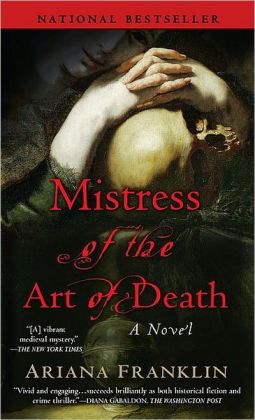I suppose reading mysteries is fairly benign, but I harbor a certain shame that they aren't somehow as worthy as other reading, that is, until I know someone else is also a mystery fan, I'll talk first about the more erudite things I've read. With the occasional exceptions of really quality writers who create fine complex characters or take on weighty social issues or teach me more about a culture (P.D.James, S.Paretsky and Tony Hillerman come to mind as examples), I tend to think of them as my escapist literature--my "comfort food" reading. So recently, having had my fill of reviewing YA books, I immersed myself in a couple of mysteries, Dead Canaries Don't Sing by Cynthia Baxter and Mistress of the Art of Death by Ariana Franklin. For anyone who likes animal characters to spice up their mystery soup, Dead Canaries is good fun; the protagonist is a veterinarian and amateur sleuth who is usually escorted by her two rescued dogs, a tail-less Westie and a one-eyed, 3-legged dalmation. She also has Cat (short for Catherine the Great) and a parrot who holds a key clue in this tale. Another animal-centric series I really enjoy is that by Rita Mae Brown; these are told from the point of view of the protagonist's cats and a dog--who claim to solve the mysteries long before their sensory-challenged humans do. But the greater of the two mysteries I read, the one that really grabbed me--you know the like, can't put it down, stay up too late, everything else goes by the wayside until I'm finished--was Franklin's Mistress. I profess a certain fondness for medieval mysteries (e.g., Umberto Eco, Sharon Penman, Candace Robb, Barry Unsworth) and this one features a woman who is a pre-cursor of the forensic specialist, trained at the medical school in Salerno, and recruited to go to Cambridge to help solve the murders of several children. Not for the faint of heart since it's fairly explicit about how the children are murdered, but rich with period details, the politics and tension between the Church and Henry II, the social strictures under which women, Jews and other non-dominant groups had to maneuver. Several characters in addition to the protagonist are well-developed and an author's note on the factual basis of several aspects of the story added to my appreciation of this well-paced story. I really hope there will be a sequel...
Keeping track of what I read by jotting down my reactions, providing information about the author, and linking to additional reviews. And occasional notes on other book related things...
Monday, September 24, 2007
As vices go...
I suppose reading mysteries is fairly benign, but I harbor a certain shame that they aren't somehow as worthy as other reading, that is, until I know someone else is also a mystery fan, I'll talk first about the more erudite things I've read. With the occasional exceptions of really quality writers who create fine complex characters or take on weighty social issues or teach me more about a culture (P.D.James, S.Paretsky and Tony Hillerman come to mind as examples), I tend to think of them as my escapist literature--my "comfort food" reading. So recently, having had my fill of reviewing YA books, I immersed myself in a couple of mysteries, Dead Canaries Don't Sing by Cynthia Baxter and Mistress of the Art of Death by Ariana Franklin. For anyone who likes animal characters to spice up their mystery soup, Dead Canaries is good fun; the protagonist is a veterinarian and amateur sleuth who is usually escorted by her two rescued dogs, a tail-less Westie and a one-eyed, 3-legged dalmation. She also has Cat (short for Catherine the Great) and a parrot who holds a key clue in this tale. Another animal-centric series I really enjoy is that by Rita Mae Brown; these are told from the point of view of the protagonist's cats and a dog--who claim to solve the mysteries long before their sensory-challenged humans do. But the greater of the two mysteries I read, the one that really grabbed me--you know the like, can't put it down, stay up too late, everything else goes by the wayside until I'm finished--was Franklin's Mistress. I profess a certain fondness for medieval mysteries (e.g., Umberto Eco, Sharon Penman, Candace Robb, Barry Unsworth) and this one features a woman who is a pre-cursor of the forensic specialist, trained at the medical school in Salerno, and recruited to go to Cambridge to help solve the murders of several children. Not for the faint of heart since it's fairly explicit about how the children are murdered, but rich with period details, the politics and tension between the Church and Henry II, the social strictures under which women, Jews and other non-dominant groups had to maneuver. Several characters in addition to the protagonist are well-developed and an author's note on the factual basis of several aspects of the story added to my appreciation of this well-paced story. I really hope there will be a sequel...
Subscribe to:
Post Comments (Atom)

2 comments:
It's true that many people- especially literary - look down on "genre" writing. Ursula Le Guin always wished that people did not classify her writing as Sci Fi, because she thought it was so much more - and I agree. I like mysteries though don't have much time to read any lately. I'm also fond of Hillerman and Dick Francis, and the old Brits - Ngaio Marsh (actually New Zealand I think), Josephine Tey, and other whose names escape me at the moment.
Sara, if you like well-drawn, psychologically complex characters in your mystery fare you can't pass up P.D.James. She is my all-time favorite British mystery writer, and an amazing person in her own right. I got to hear/see her speak in Seattle one time--what a treat!
Post a Comment